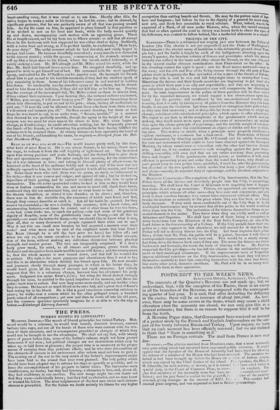THIEVES IN THE CITY.
STANDARD—There is a whimsical war waging just now between the Police of London (the City charter is not yet suspended) and the Duke of Wellington's Gendarmerie : the elected scene of hostilities is the debateable ground about Tem. pie bar ; and the battle is fought by each of the belligerents directing upon the enemy's quarter, the heaviest column of thieves and prostitutes which his utmost industry can collect in the lanes and alleys about the Strand, on the one side, and in the several similar obscure ramifications from Fleet-street on the other. In this diverting contest the night is spent : now the flood moves eastward—now to the west; and the ebb and flow of the living stream through the old gate atTem. plebar rivals in frequency the flux and reflux of the waters of the Straits of Edon, where the tide is said to rise and fall forty-eight times in twenty-four hours. Meantime the thieves and their female associates are beginning to get tired of a game in which their part is so silly and unprofitable; and they are migrating to the suburban parishes, where comparative ease will compensate for diminished gain. As some improvement in the police of these parishes will be thus called for by the imported nuisance, we would suggest a few observations upon that head. Let the parishes still unafillicted by this unconstitutional novelty Low warning, that it is only by takingaway all pretext from the Minister they can hope finally to escape the visitation. Let theta remodel or strengthen their police force as they may find necessary ; and in doing this let them not hesitate to adopt any change, consistent with constitutional principles, which seems to offer advantage., We regret to see that, in all the complaints of the gendarmerie which men are making, they dwell much more upon particular cases of misconduct es neglect than upon the odious principle of espionnage, and the terrible weight of irrespon. sibie power which make the establishment an object of dislike and fear to think- ing men. This resting on details, when a principle more properly challenges a vigilant resistance, is a common but a fatal error. The Pretest:tilts of Ireland ruined themselves by directing against Mr. O'Connell and his rabble Association the care and resentment which ought to have been directed against the Liverpool Ministry, by whose connivance or cowardice only the other had become formid. able. And we, if we content ourselves with wrangling against the poor three- shilling constables, will soon find that we are rather assisting than preventing these real dangers. If the gendarmerie should prove, as doubtless it will, more efficient in preserving peace and order than the watch has been, why should not each parish have its own police force, modelled, if need be, after the gendarmerie, hut.di vested of the two qualities which render that body a just object of dislike and alarm—tamely, its enjoined duty of espionnage, and its absolute subjection to the Al blister.
MORNING C RON ICLE—The complaint of the City functionaries, that the New Police drove all the thieves and disorderly people into the City, is exceedingly amusing. We shall have the Court of Aldermen next inquiring how it happens that rivers do not run up mountains. Thieves, we apprehend, are actuated by the principles which actuate all other men—they love ease and enjoyment, and only work in their vocation because they cannot have enjoyment without effort. They betake themselves as naturally to the place where they can live best, as a heavy body descends. If they were more comfortable out of the City than in it, the worshipful functionaries may be assured that all the police in the world would not drive them into the City. The inclination of the thieves themselves forms an es- sential element in the matter. They know when they are civilly used as well as
Aldermen and Deputies. We shall hear next of there being a conspiracy to drive Scotchmen into the Direction of the East India Company, or one of the Lord Johns to the Governorship of a Colony. If the City people raise their owa police to a state superior to that elsewhere, we will answer for it that the Nee Police will fail in driving thieves into the City. Let them improve their police then ; if they beat Mr. Peel, the public will be a gainer, because it will force a correspondent improvement on the west end. This would be a manly attempt. Let them drive the thieves hack again if they can. The more the thieves are driven backwards and forwards, the worse the trade of thieving will be. Mr. Peel has respected the City privileges—he has left the citizens in the undisturbed enjoy- ment of their municipal advantages. If the improvements west of Templehar impose additional exertions on the City functionaries, we trust they will resign themselves manfully to their fate, consoling themselves with the idea that liberty, like every other good, demands sacrifices. Mr. Peel will be in no hurry to in. terfere with them in their operations.


















 Previous page
Previous page